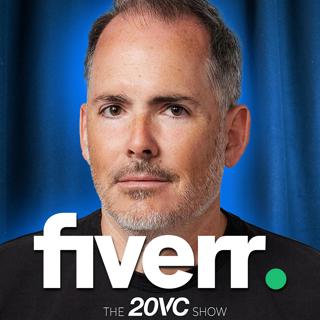
20VC: How I Lost Airbnb at Seed Because of an Exploding Term Sheet | Investing Lessons from Roelof Botha & Peter Thiel | Why VC is Less Collaborative Than Ever and Great Companies Are Being Destroyed by Too Much Cash with Kevin Hartz @ A*
Kevin Hartz is a Co-Founder and General Partner at A*, an early-stage venture capital firm. Prior to founding A*, Kevin co-founded Eventbrite, a publicly traded company, and served as the CEO for the ...
22 Juli 20241h 2min

20Product: How Canva Builds Products: Lessons Learned, What Works? What Flopped? The Top 5 Product Lessons in Scaling to 185M Monthly Active Users with Canva Co-Founder and Chief Product Officer, Cameron Adams
Cameron Adams is Chief Product Officer and co-founder of Canva where he is responsible for heading up the design and product teams. Since launching in 2013, Canva's global community has grown to over ...
19 Juli 202449min

20VC: Brex CEO Pedro Franceschi on What Brex Needs to do to be a Public Company | Brex vs Ramp: Who Wins and How Does it Play Out | Battling Founder Mental Health and The Importance of Secondaries for Founders
Pedro Franceschi is the Co-Founder and CEO @ Brex, the AI-powered spend platform with tens of thousands of customers, including DoorDash, Coinbase, Robinhood and Roblox. Pedro has raised over $1.2BN f...
17 Juli 202450min

20VC: Why We Are in a Bubble & Now is Frothier Than 2021 | Why $1M ARR is a BS Milestone for Series A | Why Seed Pricing is Rational & Large Seed Rounds Have Less Risk | Why Many AI Apps Have BS Revenue & Are Not Sustainable with Saam Motamedi @ Greylock
Saam Motamedi is a General Partner at Greylock, where he has led investments in Abnormal Security (incubated at Greylock), Apiiro Security and Opal Security, as well as AI companies like Adept, Braint...
15 Juli 20241h 6min

20Sales: Biggest Lessons Scaling Hubspot from $0-$100M in ARR, The Framework for How Startups Should Scale into the Enterprise, How to do Channel Partnerships Right and How to Construct Sales Comp Plans Early On with Mark Roberge
Mark Roberge is a Co-Founder and Managing Director at Stage 2 Capital and a Senior Lecturer at the Harvard Business School. Prior to these roles, Mark was the founding CRO at HubSpot, where he scaled ...
12 Juli 202440min

20VC: ServiceTitan Would Not Be the Success if We Raised VC Earlier: How to Build a Dominant Vertical SaaS Business, How to Master Going Into Enterprise, When & How to Launch Second Products with Ara Mahdessian, Co-Founder @ServiceTitan
Ara Mahdessian is the Co-Founder and CEO @ ServiceTitan, one of the great vertical SaaS business of the last decade. Today the company powers over 11,800 trade customers and has raised over $1.4BN fro...
10 Juli 202451min

20VC: The Sequoia Investment Process | Investing Lessons from Doug Leone, Roelof Botha & Alfred Lin | Sequoia's Framework for Analysing Founders | The True Benefit of Having Sequoia on a Cap Table & Sequoia's Biggest Threat with Pat Grady
Pat Grady is one of the most successful growth investors of the last decade. As the Head of Sequoia's growth investing practice, Pat has invested in companies with a combined market cap exceeding $250...
8 Juli 20241h 8min

20VC: Turning a $15M Investment in Monday into $1.5BN in Cash | The Strategy Behind a 37x DPI $45M Fund | The Three Step Process to Selling Positions that has Netted Top Percentile Returns with Avi Eyal, Co-Founder @ Entrée Capital
Avi Eyal is Co-Founder and Managing Partner of Entrée Capital, an early-stage VC fund with a portfolio including the likes of Monday.com, Stripe, Coupang, PillPack, and Snap. From their $15M investmen...
3 Juli 202458min






















